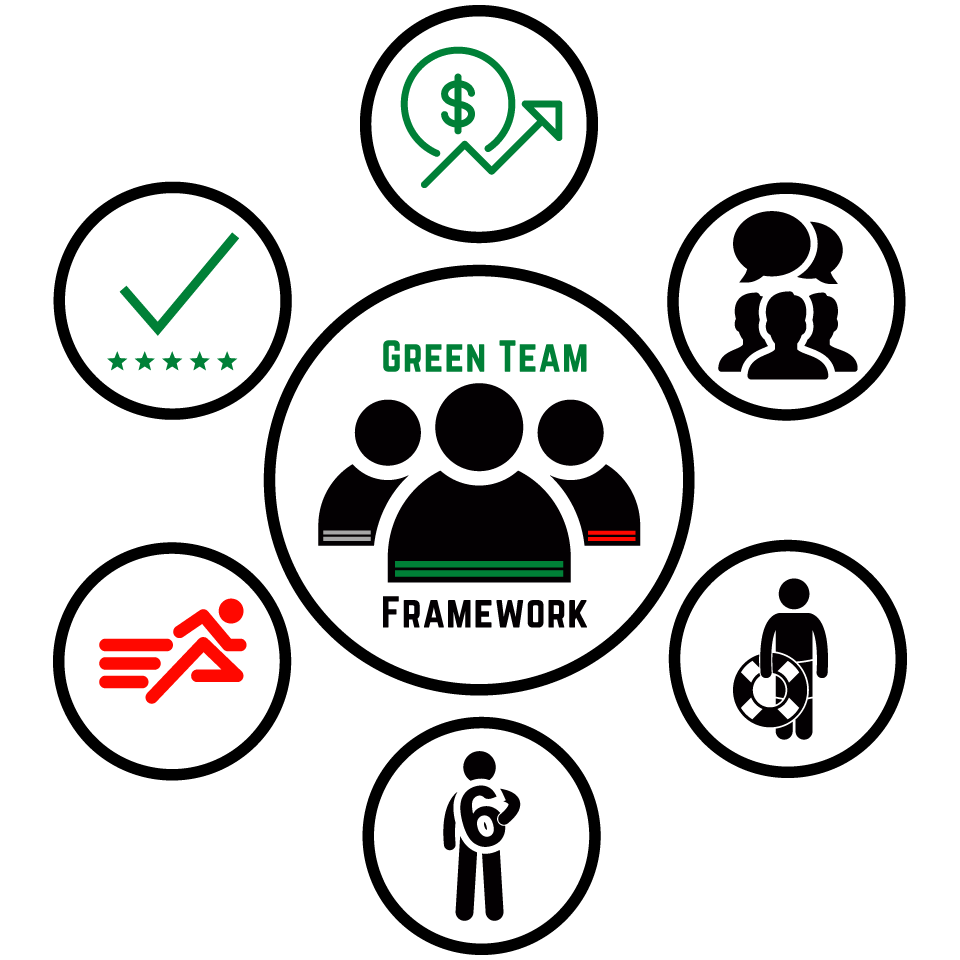Home / Blog / Self-Awareness /

Recently I sat down to help my 7th grade son with his Spanish homework the other day and was quickly transported back to my high school years, sitting in Spanish class feeling lost and tortured.
As I helped him conjugate verbs, complete sentences, and translate numbers, I kept telling myself (and him) that people who know more than one language are typically smarter and have better problem solving abilities…
Anything to keep him motivated…
Drawing the connections
At the conclusion of helping him, I sat back and turned on an episode of The Last Dance and who should come on the screen but Kobe Bryant. I called my son over and said, “Did you know Kobe spoke more than one language?” We paused the episode and began to talk about how that was one of the things that made Kobe special. I explained how Kobe lived in Italy until he was 13, so he was able to learn more than just English there. He was famed for speaking Italian, Spanish, and even some Chinese. He even heckled Luka Doncic in Slovenian (Luka’s native tongue) during an out of bounds play when the Mavericks were playing the Lakers and Kobe was sitting sideline. My son didn’t realize that Kobe knew different languages, but he was amazed to hear it.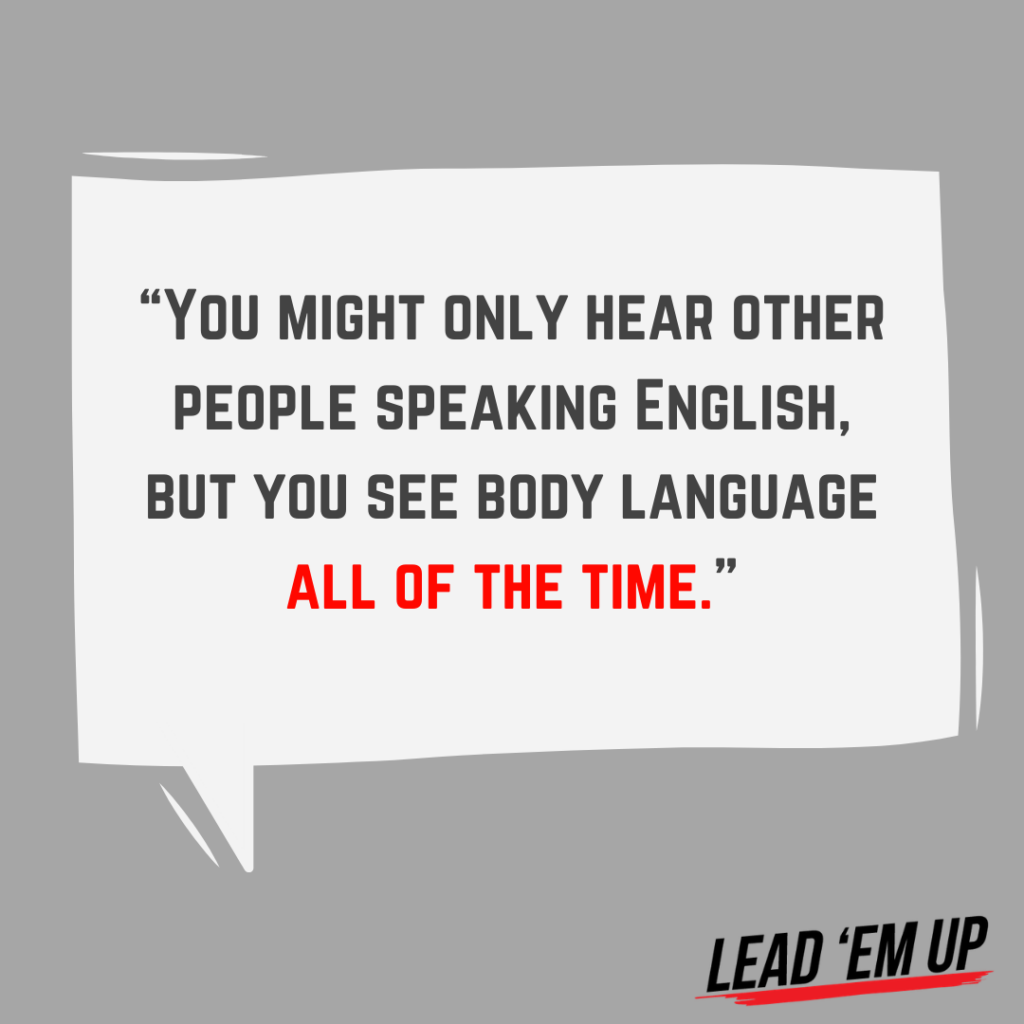
Although my son was amazed, he quickly retorted, “But I don’t live in Italy, so it’s hard for me to practice learning another language if I don’t speak it every day. The only language I speak or even hear every day is English.” He was right. We only speak English in our home, and we don’t live in an area that is highly multi-lingual.
As my brain scurried to come up with something that didn’t lose him, it was if the parent gods and sporting gods united to deliver a powerful message to me. “Body language,” I blurted as he was about to walk off. He turned, interest peeked. “You might only hear other people speaking English, but you see body language all of the time.”
He knew what body language was.
Living with a coach, he has heard me talk about it many times, but not in the context in which we were speaking. We continued our discussion and by the time we were finished, he felt like he knew (at least in part) a language other than English, and I felt like my dad game was on point.
Body language is an unavoidable byproduct of being a human being. In any social situation, you are communicating something with your nonverbal cues. A slouch, a look, or even proximity can communicate something to those around you. As an athlete trying to prove yourself as an upstanding young man or women, it is imperative that you understand to not only control your body language, but to understand that others are constantly reading it. Your coach, teammates, referees, and people in the audience are observing the way you carry yourself during competitive play. 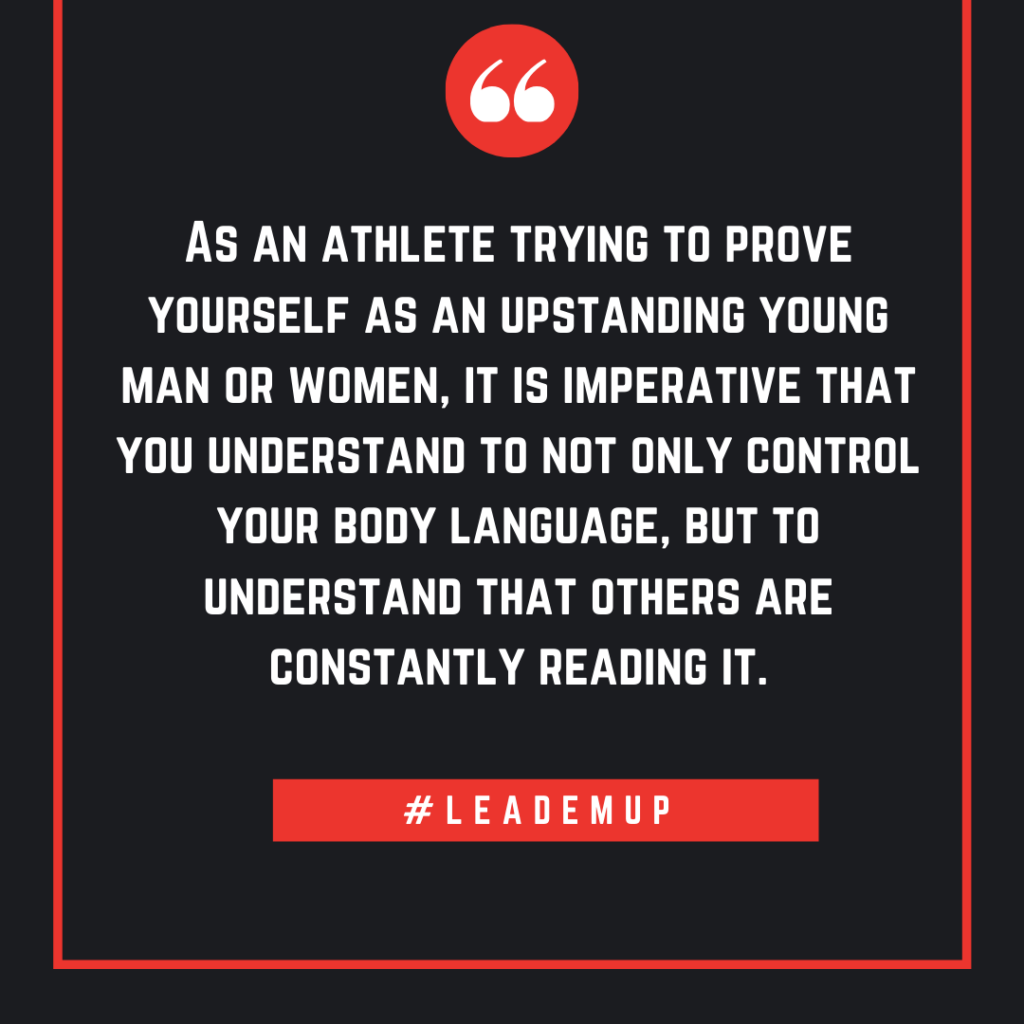
Why First Impressions Matter
Consider this: there is plenty of research out there that suggest that within the first seven seconds people will have formed a solid impression about you. This doesn’t necessarily mean their impression is accurate, but your body language and the way you carry yourself has a lot to do with that.
As an athlete, think about the first impressions you make throughout your career. Your first tryout, the first time you meet your coaches, the first time you meet your teammates, the first time you meet the referees during a game, the first time you come out of the game, the first time you are criticized, and the list goes on and on. How are you carrying yourself during these moments? Is your body language communicating a positive message, or is it creating a situation that is undermining what you want for yourself as an athlete?
There’s an interesting article on stack.com where Don Showalter, Director of Coach Development for USA Basketball and Head Coach of the USA Basketball Junior Men’s National Team, shares his thoughts on body language: “I go watch literally thousands of players each year and (watch) how they communicate with their body language when they’re sitting on the bench, how they communicate with their body language with their coach when he talks to them. Those things are very important, and what they do is portray what kind of person that player is. We tell our USA players all the time on the junior national team, if you have bad body language, poor body language on a consistent basis, you will never play for us. First of all, it’s a strong way to get across the fact that you have an attitude that’s not really what we want. Poor body language shows us that you’re susceptible to what goes on on the court and you can’t play through things. I think young kids need to know that,” Showalter said.
Can people tell you’re a winner?
Showalter goes on to talk about the difference between avoiding negative body language, not simply having neutral body language, and working towards winning body language. Think about that for a second. Do you simply want to not have negative body language, or would you prefer for someone to look at you and be able to tell you are a winner simply by perceiving the way you carry yourself? The answer seems pretty clear to me. The good news is there are several ways you can work towards achieving the body language of a leader.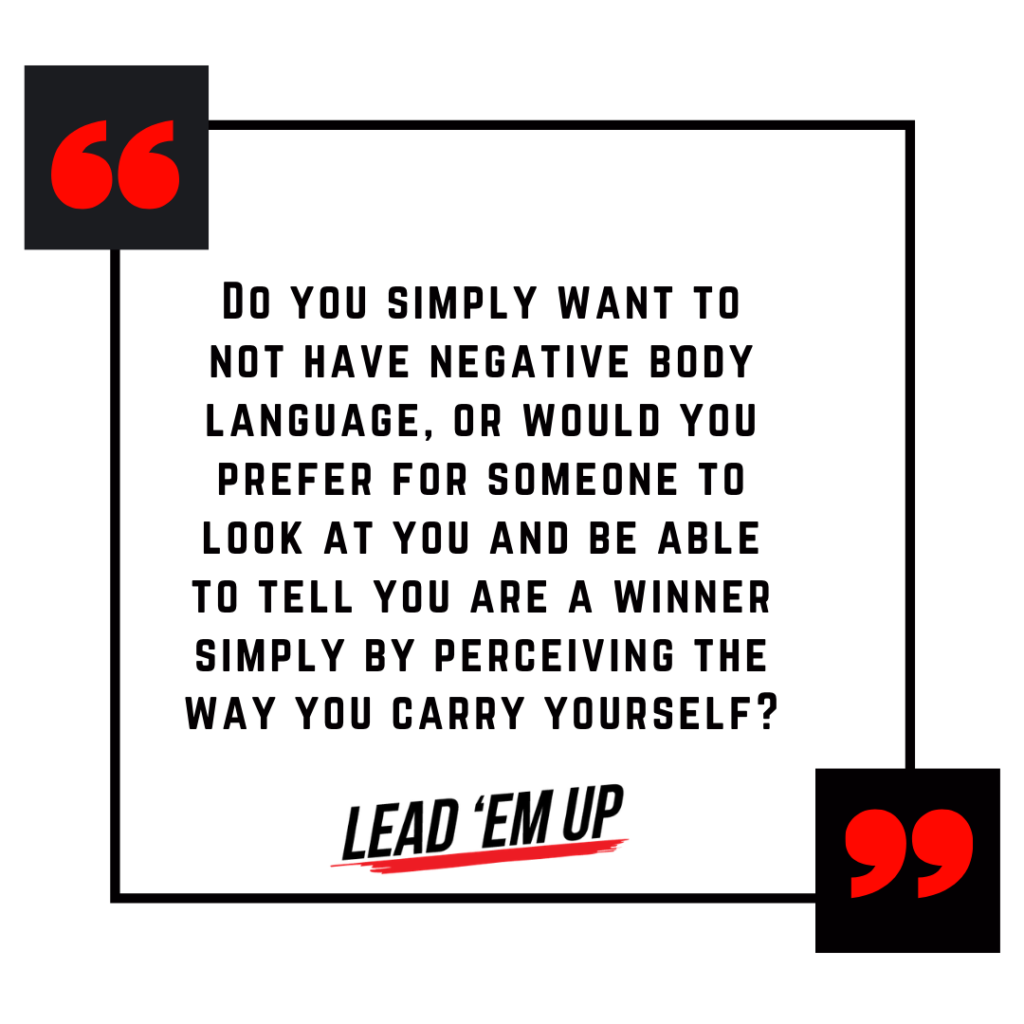
Listen, Look, and Lean
When I am coaching a player, I tell them they need to listen with their ears, eyes, and body. If I call a time out with 30 seconds left to draw up a play and a player is only listening to me, there is a possibility he may get all of what I am saying, but I doubt it. If he is listening and looking me in the eye, there is a greater chance he will get all of it. But if he is listening to me, looking at me, and leaning in to pay attention, I am confident he will be able to execute what I am asking of him. Eye contact shows, actively listening, and leaning in slightly are all ways you can show your coach you are not only interested in what he/she is saying, but that you are eager to soak it in and execute what is being asked of you.
Let Your Body Language Help You Lead…Everywhere
It is very easy to be a leader while you are playing. When you’re scoring and things are going your way, it’s a piece of cake. What about when you are on the bench? What about when someone else is in the limelight? This past season, a 7th grade basketball team I was coaching was having a fantastic game at a rival’s home court. We were winning big, and everyone was getting to play. One of the kids that got the least amount of playing time on the team was on the court and he made a move to his left, past the defender, through another two defenders, and finished with his left hand. I was psyched, and as I looked down the bench at my starters I saw our team alpha jump up out of his seat and go ballistic for his teammate on the court. These two kids aren’t friends, they don’t hang out, but they are teammates. At that moment, I not only marveled at the move the player on the court made, I marveled at the support his captain (who barely played that game) was giving him.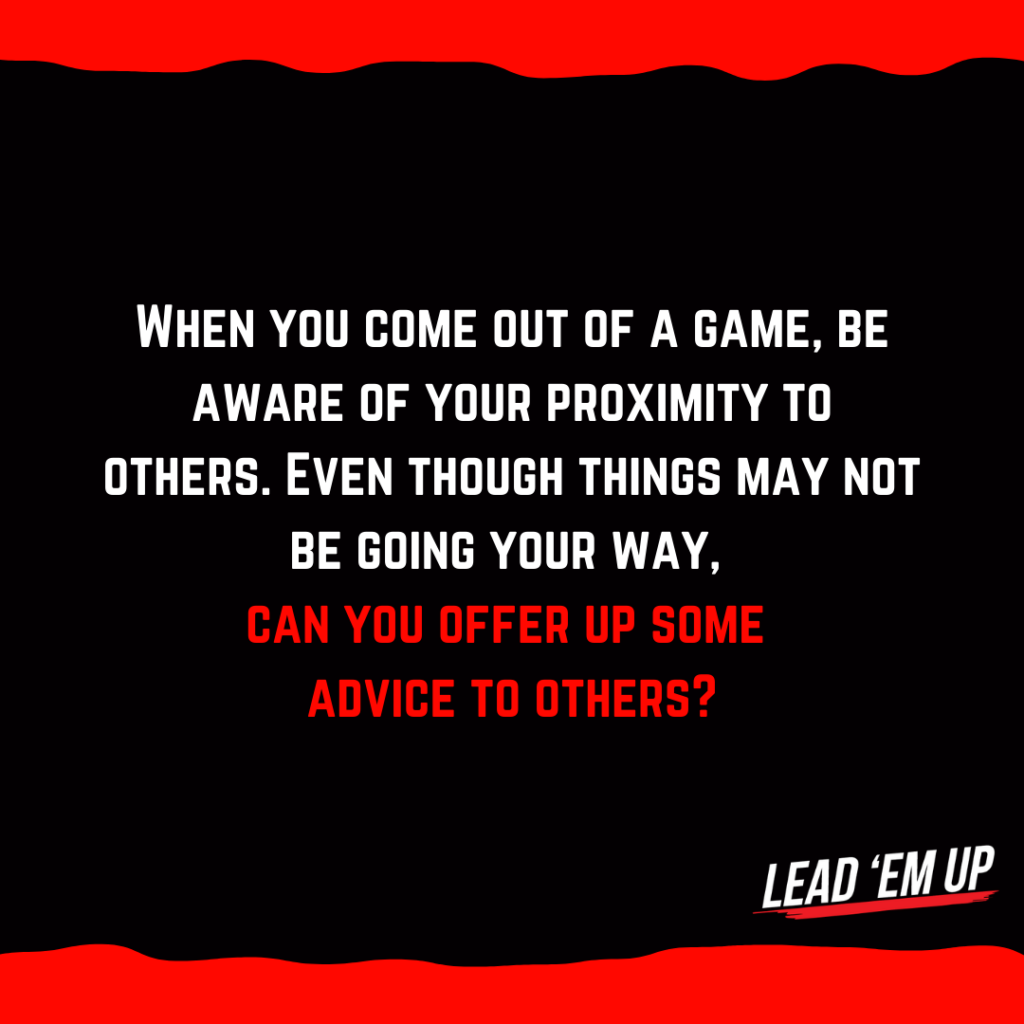
Even though you aren’t playing, even though you might be having a bad game or you might be in foul trouble, cheer your teammates on. Support them. Make sure you are clapping and staying engaged. Give them advice when they come out of the game and you go in. There are plenty of ways you can let your body language show that you are a leader even when you are not in the game.
Proximity
Last year during a touch stretch for the Los Angeles Lakers, the team called a meeting where they confronted Lebron James, their team leader, about his body language. One specific incident they sighted was him sitting at the end of the bench, far away from his coach and teammates, during a tough loss to the Indiana Pacers. This is not unique to Lebron. Russel Westbrook, James Harden, and many other NBA players have physically distanced themselves from their coaches and teammates during tough games or when things weren’t going their way. This accomplishes nothing and shows that not only are you disengaged from the team, but you don’t support them, you don’t want to be near them, and you are giving up on them. If leaning in shows you are engaged, then this is the exact opposite. So when you come out of a game, be aware of your proximity to others. Even though things may not be going your way, can you offer up some advice to others? Can you pick the brain of a coach or fellow teammate to solicit feedback that may help you? Or can you simply sit in a position where you are still engaged and being part of the team? There is always room at the end of the bench, but is that really what you want to be communicating to those around you?
You Will Make Mistakes
One of the most frustrating things to a coach is not to watch a player make a mistake, it’s to watch a player make a mistake, throw up his hands or hang his head or argue with the referee, and allow the other team to gain an advantage because the play didn’t go his way. No one makes every shot, referees miss calls, passes get stolen, turnovers happen. It’s part of every game and always will be. What doesn’t have to be part of that equation, though, is the reaction a player gives to those realities.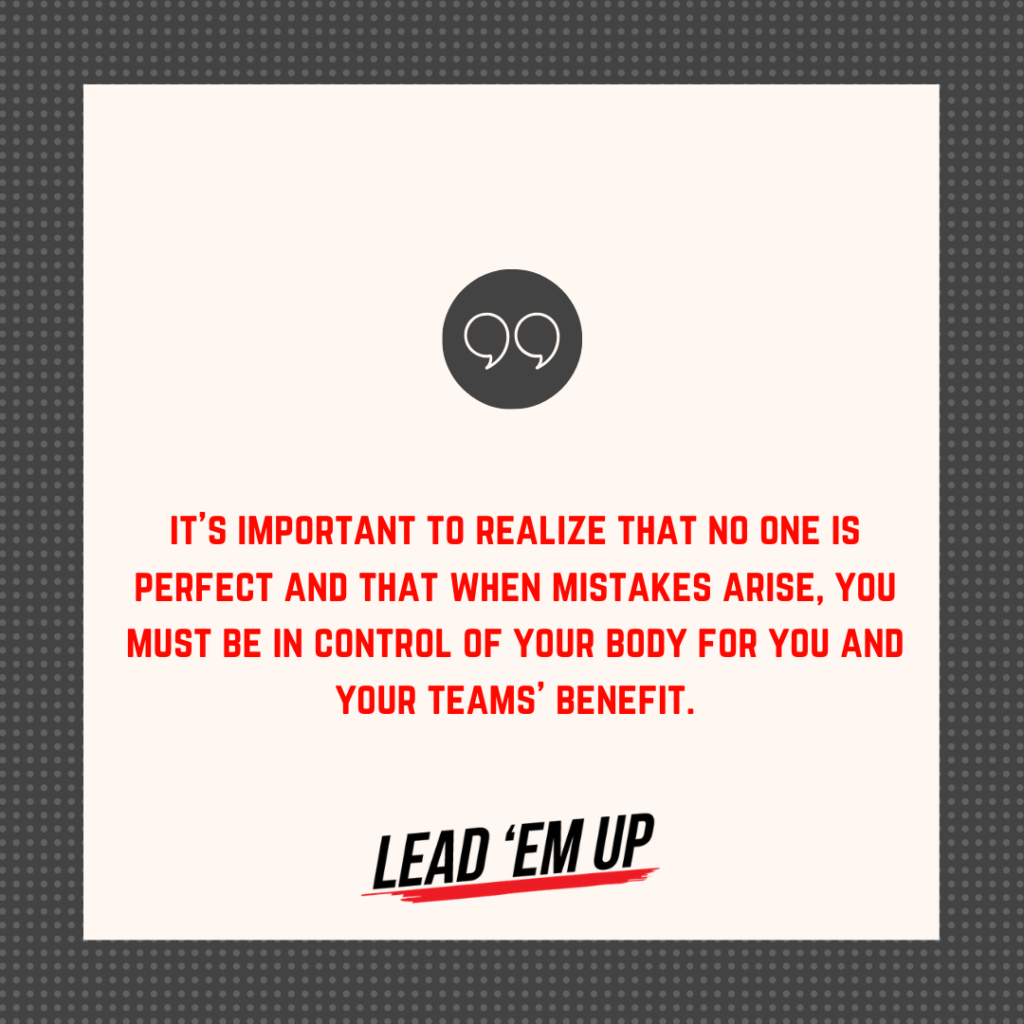
As I have told my players a million times, no referee in the history of any sport has reversed a call because a player argued the call during a game. I realize why players do this. They want everyone around them to know that they don’t normally make those mistakes. They’re better than that. What they’re really communicating, though, is that they can’t play through adversity and they are giving up on their teammates for a brief moment.
One of the best symbols I’ve seen a coach use with their players is a toilet flushing motion. The coach simply holds up his hand or finger and makes a toilet flushing motion to symbolize that the player needs to remove it from his/her mind. Other coaches have used eraser motions and other symbols to get this idea across. I’ve even seen players make this motion as soon as they make a mistake but while hustling back on defense to help their team. Whatever the case may be, it’s important to realize that no one is perfect and that when mistakes arise, you must be in control of your body for you and your teams’ benefit.
Win and Lose with Grace
We have all suffered crushing defeats and experienced the thrill of sweet victories, but have we all reacted appropriately with each? When the Chicago Bulls finally beat the Detroit Pistons in the 1991 Eastern Conference Finals, the players on the Pistons’ bench walked back to the locker room with mere seconds remaining in the game. They didn’t shake hands or congratulate the Bulls on their series win. This defiant act painted the Detroit Pistons as sore losers. This very topic was brought up in The Last Dance documentary. It is clearly something that the players and basketball historians haven’t forgotten. 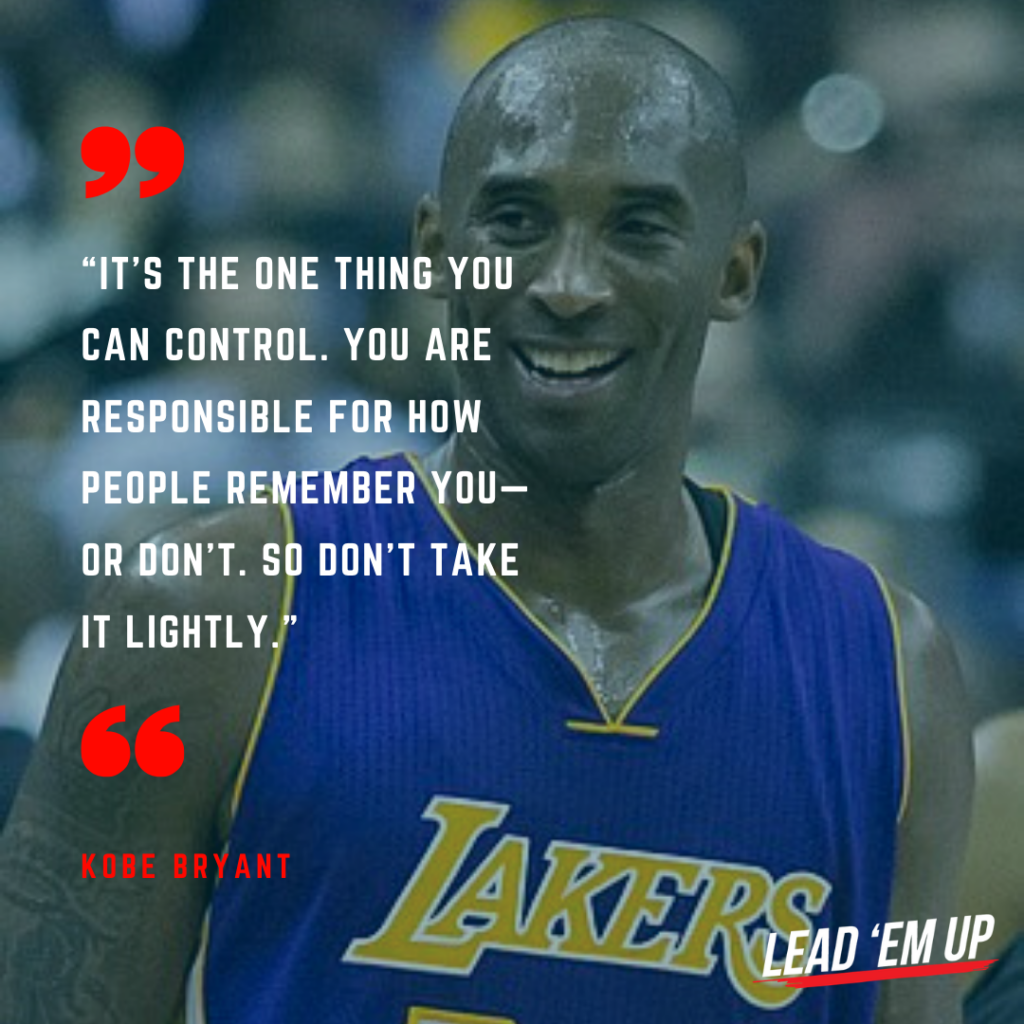
This should give all athletes pause.
How do we react during our wins and our losses and what does that say about us? Legendary coach John Wooden famously said, “All of life is peaks and valleys. Don’t let the peaks get too high and the valleys too low.” In other words, when you lose, act like a winner and when you win, act like you’ve been there before. Keep an even keel about you. This will tell those that are watching you that you have control over your emotions and that you not only respect yourself, but you respect your opponents as well.
Every athlete practices their craft in the physical sense. They lift, run, get shots up, hit more balls, run more routes, and get up more reps. But not every athlete works on self-examination. Great athletes do. The passing of Kobe Bryant earlier this year was a devastating loss to the basketball world, the world of sports, and our world in general. One thing that I have found myself doing after his passing, though, is going back and watching his games, his interviews, and reading a lot of what he wrote. In doing this, I can’t help but be captivated all over again with how Kobe carried himself both on and off the court. He got it. He understood that when people saw him they would be reading not only his words but his actions as well.
So when thinking about your own body language, remember this Kobe quote, “It’s the one thing you can control. You are responsible for how people remember you—or don’t. So don’t take it lightly.”
With the sports world on a break, we wanted to provide you a tool to keep your players engaged, growing as leaders and continuing to feel connected to their team/teammates; The 21-Day Leadership Playbook.
This FREE 21-Day Leadership Playbook is filled with various Lead ‘Em Up exercises, uniquely modified for players to do on their own, as part of a team-wide exercise.

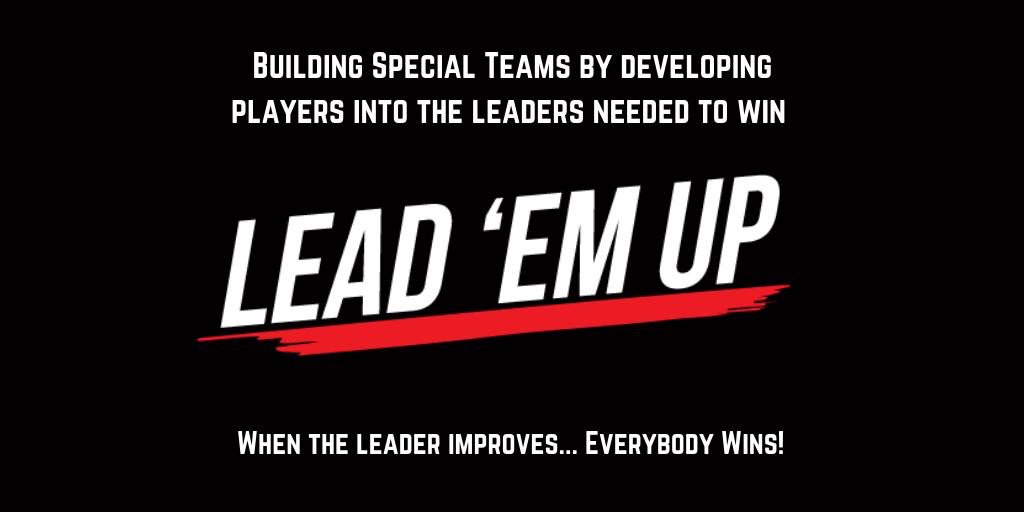
Have fun and #LeadEmUp

